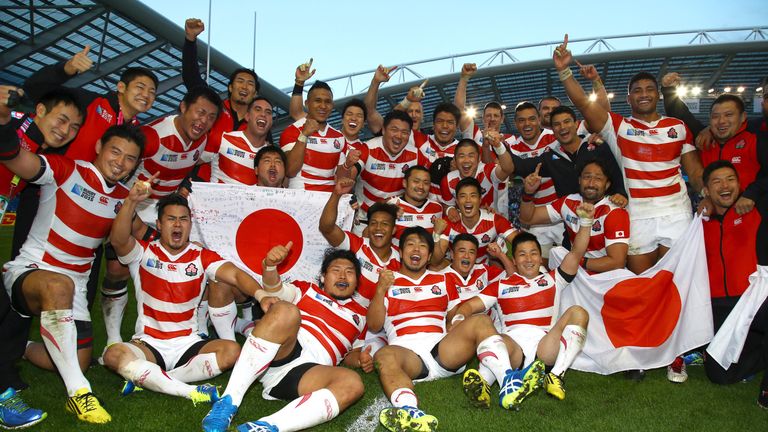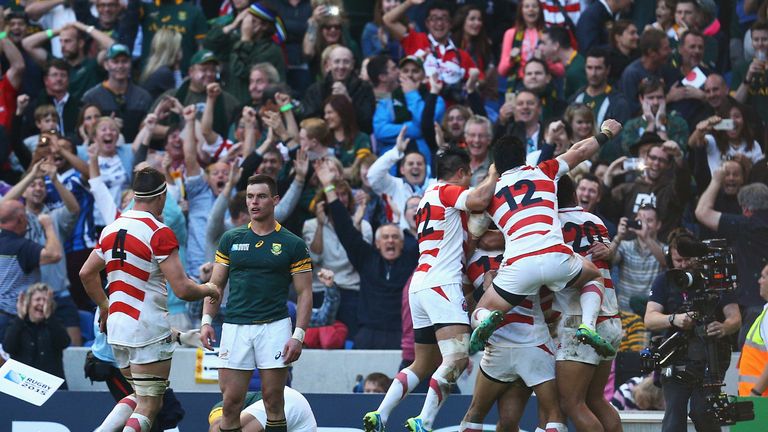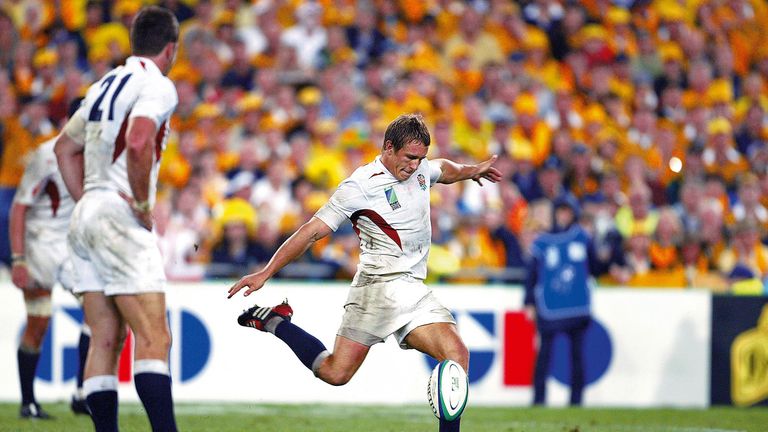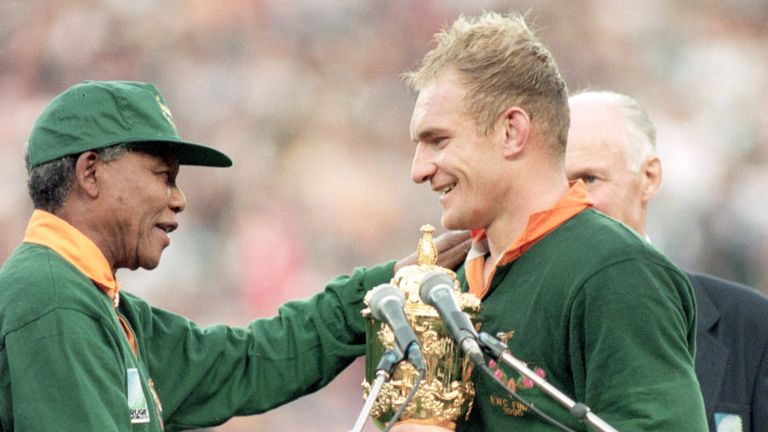Rugby World Cup: Four memorable moments on rugby's greatest stage
The 2019 Rugby World Cup kicks off on Friday September 20, and runs until the final on Saturday November 2

Tuesday 17 September 2019 13:12, UK
From Jonny Wilkinson to Nelson Mandela, we look at some of the most striking moments in Rugby World Cup history ahead of the 2019 edition's big kick off...
Japan shock the sporting world
Still, four years on, it's one of the most incredible sporting moments to look back upon. Japan faced the Springboks at the Rugby World Cup in 2015 and were expected at best to keep the score respectable in defeat, at worst to get blown away.
Yet, Eddie Jones' spirited charges kept neck-and-neck with the Springboks in Brighton - whose sheer physical size dwarfed the Brave Blossoms across the park - before pulling off the greatest shock in rugby history - maybe even sporting history.
It was the first ever meeting between the two nations, and after an early Japan penalty, the Test seemed to settle in predictable fashion as Francois Louw scored the opening try at the back of a rolling maul which romped over with ease.
But, to the surprise of everyone watching, Japan replied with a maul try of their own - a 10 man version with backs piling in - as skipper Michael Leitch touched down over the line.
The Boks and Bismark du Plessis responded within three minutes, touching down at the back of another rolling maul to leave things 12-10 to South Africa at half-time - the Japanese team earning a standing ovation as they departed.
Lood De Jager and Adrian Strauss tries into the second half each looked set to put the Boks on their way, but they couldn't shake Japan as the boot of Ayumu Goromaru kept his team in touch - four penalties in 15 minutes either side of the Boks tries - and a wonderfully worked try by the same player left things, almost unbelievably, 29-29 with 10 minutes left.
A Handre Pollard penalty with seven minutes remaining saw South Africa regain the lead 32-29, before the real drama started. Japan, playing at phenomenal pace, worked their way up to and inside the Bok 22, and played through 19 phases before South Africa's Coenie Oosthuizen was sin-binned for killing the ball on his own try-line.
And then, having turned down two penalty shots and chances to draw level, and having been held up over the try-line once before, Japan and Karne Hesketh struck in the corner - four minutes into dead time - to provoke pure unadulterated bedlam in Brighton, Japan and across the rugby community. It was pure magic.
Les Bleus stun All Blacks
Perhaps the greatest Rugby World Cup Test of all time, France vs New Zealand in their 1999 semi-final was described, at the time, as the biggest upset in World Cup history.
There are underdogs in World Cup knockout games, and then there is France against the All Blacks in 1999. Les Bleus had lost by 47 points to the same opposition four months previously. They had finished the Five Nations rock bottom six months previous after defeats at home to Wales, away to England and to Scotland in Paris.
And during the World Cup pool stages, they had shipped 20 points to Canada, 13 points to Namibia and 19 points to Fiji - all in victory, but alarming nonetheless. They were expected to get destroyed at Twickenham, with the All Blacks monumental favourites.
France started brightly, and when 5'7" wing Christophe Dominici ripped through the All Blacks defence from his own half, out-half Christophe Lamaison strolled over for the opening try.
The All Blacks responded via the late great Jonah Lomu within four minutes, as the wing produced a trademark bulldozing score past seven Frenchman unable to deal with him, ahead of New Zealand heading in at half-time with a seven point lead.
When Lomu struck again five minutes into the second period - bundling five France players out of the way on a run from 30 odd metres out - the New Zealand lead was 14 points, and the game appeared over.
Two drop goals and two penalties from Lamaison cut the gap to two, and when Dominici took advantage of a wicked bounce after a Fabien Galthie kick ahead on turnover ball, France sensationally had a five-point lead.
On the hour mark, a Lamaison chip over the top of the New Zealand defence was then seized upon by centre Richard Dourthe, sending Twickenham wild with France gaining a scarcely believable 12-point lead.
When wing Philippe Bernat-Salles scored a fourth French try on the break with six minutes remaining, the score was stretched to 43-24. Jeff Wilson notched a consolation into the final minute to leave things 43-31, but it was France's day after a quite breathtaking performance.
Wilkinson drops a goal for glory
Heading into the 2003 World Cup in Australia, England and head coach Clive Woodward had put huge pressure on themselves by anointing the team the best on the planet.
England deservedly had that mantle, having clinched a Grand Slam and beaten both the All Blacks and Australia away from home in the lead up to the tournament. But even still, expectation was huge.
By the time of the final, having beaten South Africa in their pool and Wales and France in the quarter-finals and semi-finals respectively, England were to face hosts Australia - the Wallabies having knocked out the All Blacks in the semi-final.
Led by Eddie Jones, Australia hit the front in the final on six minutes when wing Lote Tuqiri towered over Jason Robinson to claim a Stephen Larkham cross-field kick.
Three Jonny Wilkinson penalties saw Woodward's charges gain a 9-5 lead, and when Robinson slid in for a try two minutes from the interval after a flowing move, England had a healthy 14-5 half-time advantage.
England weren't to score a point in the second half though, as Wilkinson missed with two drop-goal attempts, and Wallabies 10 Elton Flatley punished them with three penalties, one in the very last minute of the game, meaning extra-time would follow.
A penalty apiece in extra time left things 17-17, before England created one last opportunity after scrum-half Matt Dawson made a critical break up the middle to set up Wilkinson.
With just 26 seconds left on the clock, the out-half bisected the posts with a drop goal via his weaker right foot to cue ecstasy and a stunning finish to the final. It remains the greatest day in English rugby history.
Mandela and Pienaar unite SA
Rugby's first and second World Cups in 1987 and 1991 were shorn of the Springboks as a result of the international sports boycott due to apartheid.
The sport's third edition of the tournament in 1995 therefore marked South Africa's first involvement, as they hosted the competition in the wake of negotiations to end apartheid.
Against defending champions Australia in the opening game, the Boks announced themselves with a superb 27-18 win at Newlands, going on to top their pool before beating Western Samoa and France en route to a home World Cup final.
There, they faced the All Blacks at Ellis Park and a tight first half left things 9-6 to South Africa following two penalties and a drop goal by Joel Stransky.
Andrew Mehrtens levelled the tie with a drop-goal on 55 minutes, and should have won it late on with another attempt centrally from just outside the 22, but sliced wide, sending the game to extra time - the first time a Rugby World Cup final had done so.
New Zealand edged in front when Mehrtens converted a long-range penalty, but Stransky would have the final say as he levelled things via a penalty and then won the game with a 30-metre drop-goal.
At the conclusion of the final, South Africa president Nelson Mandela emerged, clad in Springbok kit, to pass skipper Francois Pienaar the William Webb Ellis Cup in a near unbelievable symbol of the nation's progression.
It has gone down as one of the most iconic moments in the history of sport, and an undying image which will never be forgotten about.


















